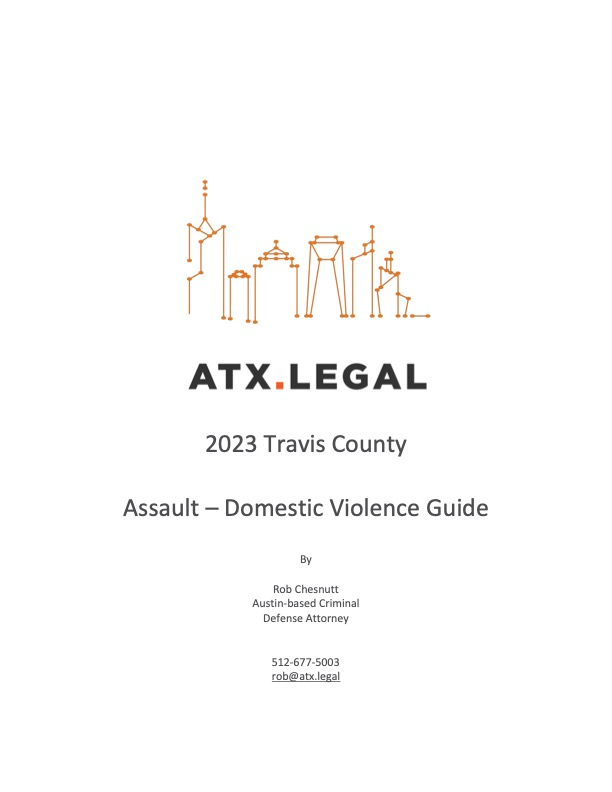Austin Assault Attorney
Austin Assault Lawyer | Central Texas Criminal Defense Attorney
If you or a loved one are facing criminal charges for assault in Austin, Texas, it is important to seek out an Austin criminal defense lawyer. Assault charges can have serious consequences, including time in custody and heavy fines. Having a skilled criminal defense attorney on your side can make all the difference in the outcome of your case.
At ATX Legal, our law firm understands that being accused of assault can be an overwhelming experience. Criminal defense lawyer Rob Chesnutt has a strong track record of successfully defending clients facing assault charges in Austin. We are dedicated to protecting the legal rights of our clients and ensuring they receive fair treatment under the law. Fill out a contact form or call 512-677-5003 for a free consultation.
What is Assault?
In Texas, assault is defined under Section 22.01 of the Texas Penal Code. An individual can be charged with assault if they intentionally, knowingly, or recklessly cause bodily injury to another person, including their spouse.
Criminal charges also apply if an individual threatens another person with imminent bodily injury, or if they intentionally cause physical contact with another when they know the other will regard it as offensive or provocative.
Penalties for Assault under Texas Law
Under Texas criminal law, the penalties for assault can vary greatly depending on the specifics of the case. At the most basic level, assault is usually considered a Class A misdemeanor, which can result in up to one year in jail or a fine of up to $4,000, or both.
However, if the assault causes serious bodily injury or is committed against a public servant, family member, or a person with whom the defendant has a domestic relationship, it may be considered a third-degree felony. Additionally, if a deadly weapon was used during the assault and serious bodily injury occurred, the aggravated assault charge could be elevated to a first-degree felony. This is the most serious level of assault charge under Texas law, and can result in 5 to 99 years in prison and/or a fine of up to $10,000.
There may also be collateral consequences of an assault conviction, such as difficulty finding employment, loss of certain civil rights, suspension of professional licenses, and potential damage to personal relationships. Click on this blog post to better understand the difference between simple and aggravated assault.
Jail Release for Assault Charges
Being released from jail on an assault charge can be a challenging process due to the violent nature of the crime. If a friend or loved one has been arrested for assault, it is important to seek legal counsel immediately.
Experienced criminal defense attorneys can facilitate the jail release process, and provide advice on the next steps. They can negotiate bail amounts, prepare a defense strategy, and guide individuals through the legal proceedings. An experienced criminal defense attorney can often procure a Personal Recognizance bond even if it is denied by the judge initially.
Simple Assault
Simple Assault is typically charged as a Class C misdemeanor in Texas, which carries a penalty of up to $500 but no jail time. This is often the charge when the assault involves threatening someone with bodily harm or causing minor bodily injury.
Assault with Bodily Injury
Assault with bodily injury is a step above simple assault and is charged as a class A misdemeanor. This charge is typically used when the victim has sustained some form of physical injury, regardless of severity. The penalties for this charge include up to one year in jail and a fine of up to $4,000.
Assault Against a Family Member
Assault against a family member carries additional consequences under Texas law. This type of assault is considered domestic violence and a criminal conviction can lead to mandatory counseling, probation, or even loss of firearm ownership rights. The penalties for this charge also increase if the victim is pregnant or a child under 14 years of age.
Aggravated Assault
Aggravated assault is a more serious form of assault charge and results in felony charges. It carries significant consequences, including prison time and hefty fines. This charge involves causing serious bodily injury or using a deadly weapon during the assault. Depending on the circumstances, this charge can be elevated to a first-degree felony, carrying a maximum sentence of life in prison. Even if the charge is reduced, a deadly weapon may need to be forfeited as part of the plea agreement.
Sexual Assault
Sexual assault is a grave offense under Texas law, often referred to as rape in other jurisdictions. This sex crime involves any non-consensual sexual activity, which can range from unwanted touching to forced sexual intercourse.
The consequences, including substantial prison time, hefty fines, and mandatory registration as a sex offender, can have long-lasting, damaging effects on a person’s reputation, personal relationships, and employment opportunities. If you’re facing sexual assault or charges, it’s crucial to seek legal counsel immediately to navigate the complexities of the legal system and defend your rights.
Assault on a Police Officer
Assault on a police officer is dealt with severely due to the risk it poses to law enforcement personnel and the general public. This crime involves intentional physical harm, threat of harm, or provocative contact with a law enforcement officer while they are performing their duties.
The charge can be enhanced if a weapon is used or if serious bodily injury is inflicted. Penalties for assaulting a police officer include rigorous imprisonment, substantial fines, and a permanent record of the felony conviction, which can severely impact future employment prospects and personal freedoms. The severity of the penalties underscores the necessity of competent legal representation when facing an accusation of this nature.
Common Defenses for Assault Charges
If you are facing assault charges, it is crucial to seek out criminal defense lawyers immediately. An experienced criminal defense attorney can will often find a way to fight the State’s evidence. In some cases, your assault charges can be completely dismissed.
In some cases, self-defense or defense of others may be a viable defense against an assault charge. Additionally, a lack of intent or consent can also be used in certain situations to defend against the charges. Your attorney will carefully analyze the evidence and circumstances surrounding your case to determine the best course of action.
Restraining Orders in Assault Cases
Restraining orders, also known as protective orders, play a significant role in assault cases. They serve as a legal device designed to protect victims from further threats or harm by legally preventing the alleged perpetrator from approaching or contacting them.
There are several types of restraining orders, with the temporary restraining order (TRO) being one of the most commonly issued. A TRO is typically granted when immediate protection is needed, before a full court hearing can be held to determine whether a permanent restraining order is appropriate. These orders can apply in any situation where imminent danger is perceived.
The specifics of a TRO can vary widely, but they generally include requirements that the alleged offender stay a certain distance away from the victim, their home, workplace, or school, and refrain from making any form of contact.
Extending or Making a Temporary Restraining Order Permanent
While a Temporary Restraining Order (TRO) is typically issued for a short period (usually 90 days), it can be extended or even made permanent under certain circumstances. To do this, a formal court hearing must be held. During this hearing, the individual whom the TRO protects must present evidence to justify the need for an extended or permanent order. This evidence can come in various forms, such as witness testimonies, police reports, or medical records, and it must convincingly demonstrate a continued risk of harm or harassment.
The alleged offender is also given an opportunity to present their case and may attempt to refute the evidence or argue against the need for an extended or permanent order. The judge will consider evidence from both sides before making a decision. If an extended or permanent restraining order is granted, the terms may remain the same as the TRO, or they may be modified based on the judge’s assessment of the case.
Bond Conditions in Assault Cases
In assault cases, the judge may set a bond or bail condition for the accused. This bond serves as an assurance that the accused will return for subsequent court appearances if released from jail. The conditions of the bond can be wide-ranging and often depend on the severity of the alleged assault, the defendant’s criminal history, and their potential threat to the victim or the community.
Typically, the bond conditions may include restrictions similar to those in a restraining order, prohibiting the accused from contacting the victim directly or indirectly. The accused may also be required to stay a certain distance away from the victim’s home, workplace, or school. In some cases, the judge may stipulate additional conditions, such as attending anger management classes, abstaining from alcohol or drugs, or surrendering any firearms.
Violation of any bond conditions can result in immediate arrest and the revocation of the bond. Consequently, the accused would have to remain in jail until the trial. Criminal attorneys can have an impact on bond conditions, potentially lessening their severity.
Is it possible to have Assault charges dismissed?
There are various strategies that a skilled defense attorney can use to fight assault charges and potentially get them dropped or reduced. Some of these strategies may include challenging the credibility of the alleged victim, presenting evidence of self-defense, or arguing that there was no intent to cause harm.
Additionally, if there are any procedural or evidentiary issues with the case, such as a lack of probable cause for the arrest or mishandling of evidence, a defense attorney may be able to file a motion to suppress evidence or dismiss the charges altogether.
However, every case is unique and ultimately, it will depend on the specific circumstances and strength of the prosecution’s case. It is important to seek legal representation from the best criminal defense lawyers who can evaluate your case and guide you through the best course of action.
Pretrial Diversion and the Family Violence Intervention Program (FVIP)
In some cases, a first-time offender may be eligible for pretrial diversion. In Travis County, this is called FVIP. These programs allow the accused to complete certain requirements, such as counseling or community service, in exchange for having the charges dropped.
Pretrial diversion is typically offered for first-time offenders and may require the accused to take responsibility for their actions and complete certain conditions outlined by the court. Successfully completing the program can result in no criminal record, which can be crucial for future employment or housing opportunities, and avoiding a family violence (FV) finding.
Pretrial diversion may not be available for all assault charges, particularly those involving serious bodily injury or a previous conviction of family violence, or aggravated assault. It is up to the discretion of the prosecutor whether or not to offer pretrial diversion.
The Importance of Hiring an Experienced Defense Attorney
In any criminal case, it is crucial to have a skilled and experienced defense attorney on your side. This is especially true in assault and aggravated assault cases. A criminal defense lawyer can fight for your legal rights in court and assist in negotiating a plea bargain or advocating for pretrial diversion.
When facing assault charges in Central Texas, it is important to seek Austin criminal attorneys who can evaluate your case and guide you through the best course of action. They can help ensure
Texas Assault FAQs
What happens if the alleged victim wants to drop the charges? Does this mean my case will be dismissed?
It’s a common misconception that if the alleged victim decides to drop the charges, the case will be dismissed automatically. However, the decision to proceed with or drop charges rests with the district attorney’s office, not the alleged victim. Even if the victim chooses not to pursue the case, the prosecutor may still decide to proceed in criminal court if they believe they have sufficient evidence.
Can my case be sealed after a deferred adjudication?
Yes, in certain circumstances, criminal cases can be sealed after successful completion of a deferred adjudication. This process, known as an “order of nondisclosure,” effectively seals your criminal record from the public, although certain government agencies will still have access to it.
HOWEVER, deferred adjudication for domestic violence does NOT allow for a sealing of the record, and does result in a FV finding. It’s important to consult with your defense attorney to understand if you qualify for this option.
Can I avoid custody for assault charges?
The potential penalties for assault charges can vary significantly depending on the specifics of the case. In some cases, alternatives to custody, such as probation, community service, or diversion programs, may be possible. However, this is highly dependent on the severity of the assault, any previous convictions, and the discretion of the court. Aggravated assault, for example, is far more likely to result in time in custody. Discuss your case with experienced criminal defense lawyers to understand all possible outcomes.
Get the guide on Assault Charges in Travis County (Free PDF Download)
ATX Legal criminal law office has created a downloadable PDF guide to handling assault charges in the Travis County criminal justice system. Click here to download. It’s completely free and may help you navigate your criminal charges.
Facing Assault Charges? Get the Best Defense Possible in Central Texas
If you are facing assault charges in Travis County, it’s important to have the best defense possible. Austin Tx criminal defense lawyer Rob Chesnutt has a proven track record with aggressive defense for clients facing assault charges and other criminal offenses.
We understand the serious consequences that come with an assault conviction, including potential time in custody, fines, and a permanent criminal record. That’s why we work tirelessly to analyze the details of your case, gather evidence and witness testimonies, and build a strong defense strategy to fight for your rights.
Don’t wait – Contact an experienced Austin assault attorney today
If you or someone you know is facing assault charges in Travis County, don’t hesitate to contact us. Our Austin criminal defense attorneys will provide you with a free consultation to discuss your case and your legal options. We handle criminal defense cases in Travis, Hays, and Williamson counties.
Our law firm will work with you to protect your rights and help you achieve the best possible outcome. Don’t wait – contact us today for an aggressive defense against assault charges. Remember, it’s never too early to start building your case and protecting your future.




